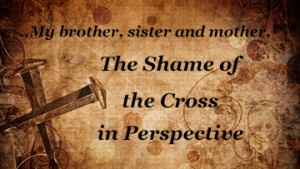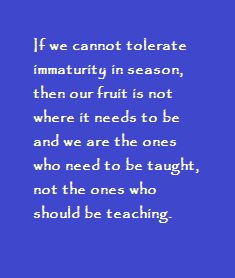Who is My Mother, Brother, Sisters? The Shame of the Cross in Perspective.
 This is the grown up version of Lesson #42 of my next book designed for families – Context for Kids: Honor and Shame in the Bible, due out next month. Ever wonder why even children in non-Western cultures won’t deny Messiah – even when threatened with death?
This is the grown up version of Lesson #42 of my next book designed for families – Context for Kids: Honor and Shame in the Bible, due out next month. Ever wonder why even children in non-Western cultures won’t deny Messiah – even when threatened with death?
Never have I labored over a teaching to the point of becoming physically ill, nor have I ever before been burdened with such overwhelming grief over the responsibility of teaching something in such a way as to be absolutely honest and to bring honor to my Savior. I couldn’t comprehend how to do it – how do I teach adults, much less adolescents and teens, about the shame of the cross. After soliciting prayer from a good friend and mentor yesterday afternoon, it finally dawned on me and I saw diverse elements in the Scriptures come together in an unexpected way.
I admit it, I never saw these Scriptures as being applicable beyond the confines of a fictive kinship group.
Matt 12:48 But he replied to the man who told him, “Who is my mother, and who are my brothers?” 49 And stretching out his hand toward his disciples, he said, “Here are my mother and my brothers! 50 For whoever does the will of my Father in heaven is my brother and sister and mother.”
Mark 3 and Luke 8 also record this account, which I always simply took at face value. A fictive kinship group describes the phenomenon where people claim family status with non-blood kin based upon some other agreed upon criteria (the best example might be the kinship between men who were part of the same platoon for the duration of a war). In this case, Yeshua (Jesus) claims that all who do the will of God are part of Yeshua’s kinship group. So what then is the will of the Father in Heaven? Sometimes we come up with easy, pat answers. I was laboring in prayer yesterday afternoon, deeply distressed, about the crucifixion of Yeshua – even to the point of being physically ill. I was wondering how to present the horrifying shame of the cross to younger people – because even Mel Gibson’s The Passion portrayed a dignified Messiah on the cross, in terrible pain and yet allowed to retain His dignity. We in the West like to focus on His suffering as though physical pain is the worst possible, and yet a teenager who cuts himself in order to avoid the pain within testifies to the fact that physical pain is not the worst manifestation of agony. Crucifixion wasn’t about physical pain, it was about stripping a man of his most precious commodity, his honor – subjecting him to utter and complete ruination, agony within and without, stripping Him of every shred of dignity and then allowing him to endure that shame as he died very slowly to the delight of the gathered crowds. There are things about crucifixion that no movie would ever dare portray. Our Savior was humiliated beyond our ability to comprehend, but we don’t like looking at a shamed Messiah. We like to see Him up there, wronged but still a picture of dignity. He had to bear our shame, and our humiliation – and our shame and humiliation, well-deserved, could not be dressed up in dignity. We don’t want to really see what our shame looked like. Really, it doesn’t look nearly as bad when the only pain being inflicted is portrayed as physical. People from honor/shame cultures understand this intrinsically, and are unwilling to dishonor Yeshua once they have tasted His salvation; they die before denying Him whereas in the West, we often don’t even want to face our family’s wrath if we choose to celebrate Passover and Sukkot instead of Easter and Christmas.
But back to the story, as I was praying about how to do this, heartbroken and sick – these verses came to me and I finally got it.
John 19:25 but standing by the cross of Jesus were his mother and his mother’s sister, Mary the wife of Clopas, and Mary Magdalene. 26 When Jesus saw his mother and the disciple whom he loved standing nearby, he said to his mother, “Woman, behold, your son!” 27 Then he said to the disciple, “Behold, your mother!” And from that hour the disciple took her to his own home.
Why the mention of this? I always wondered. Mary had several other sons – she had men to take care of her. Why give her to John? Yeshua, as first born, could only hand His mother over to a family member, and why was John always referred to as the “disciple Jesus loved?”
“For whoever does the will of my Father in heaven is my brother and sister and mother.”
And I understood, there at the foot of the cross we learned the will of the Father – look upon the full shame of the cross and never, ever look away again. Never forget what our shame looked like. Never forget the sight of the Man who bore it for us. We can’t turn our heads away from the shame that He endured, our shame, the full measure of it. In crucifixion there was no dignity afforded the victim. He was not given the dignity of being clothed even in a loincloth, the flies and birds probably didn’t leave Him alone, flogging and crucifixion were designed to wear a man out so quickly that he wouldn’t even retain control over his own bowels and bladder. We want a dignified Savior because it hurts too badly to look at the true measure and seriousness of our shameful sins. Over and over again throughout the Scriptures, front to back, we are told of that shame, and the penalty of that shame. That shame had to be taken away by someone, and we can at least look at it, and once we do we had better never think we can turn away or deny it. We were freed yes, and we should rejoice, but we don’t dare forget it.
“Take up your cross and follow me.”
To be crucified was the greatest shame imaginable, and we are commanded to own that shame as having been our own, and to live in such a way as to never purposefully shame Him again.
Heb 6:4 For it is impossible, in the case of those who have once been enlightened, who have tasted the heavenly gift, and have shared in the Holy Spirit, 5 and have tasted the goodness of the word of God and the powers of the age to come, 6 and then have fallen away, to restore them again to repentance, since they are crucifying once again the Son of God to their own harm and holding him up to contempt
We cannot accept His suffering for our shame and then reduce Him to shame again by denying Him. If we deny Yeshua, we are saying that He rightly died as a criminal for the crime of claiming to be the Son of God. We are guilty of convicting the one who was shamed for our sake – we cannot hold Him up to that shame and contempt again after that. Peter denied Yeshua before He went through that shame, but never afterwards. Not one of them denied Him or ran away afterwards.
Hebrews 9:27 tells us plainly that man is destined to die once – we cannot crucify our Master again.
People in honor/shame cultures understand this. They are willing to face death, even at the hands of their own families.
Six times in I Corinthians, Paul talked about the foolishness of the cross, and of the foolishness of the wisdom of God – as perceived by the world. To follow a shamed criminal in the first century world was a stumbling block for the Judeans (many of the Jerusalem elites) and foolishness to the Gentiles.
In the end, as He was about to die, Yeshua hung there in full sight of the mockers and scoffers who watched crucifixions for the entertaining public spectacle that they were – and He hung there in front of His mother, brother and sisters – naked, His genitalia swollen for the crowd to gawk at, His body distorted out of shape, covered in His own blood and feces.
His mother Mary
John
Mary, wife of Cleopas
Mary Magdalene
They did not despise the shame of the cross, they looked at that shame with both eyes opened – they did the will of the Father in Heaven and never turned away. It is loyalty, and not genetics, that set them apart as His family – and in the end, that meant that Yeshua only had one brother to whom He could entrust His mother.
Do you see the love with which He has loved us? Do you see the absolute loyalty demanded of us?
Glory be to our Great King that Yeshua is no longer on that cross, no longer shamed but instead honored, exalted and glorified – but we can’t afford to forget what He endured so that our shame could be removed. We must live such lives that we never bring Him to shame on purpose ever again. I don’t cherish that old rugged cross, but I cherish the One who died upon it – may my life be well-spent in His service.
I am picking up my cross, I am owning my shame that was taken from me, and I am following Him.
Recommended online reading/viewing:
Despising the Shame of the Cross by Jerome Neyrey
The Restored Honor of Our King by Rico Cortes
The Holy Bible: English Standard Version. (2001). Wheaton: Standard Bible Society.



